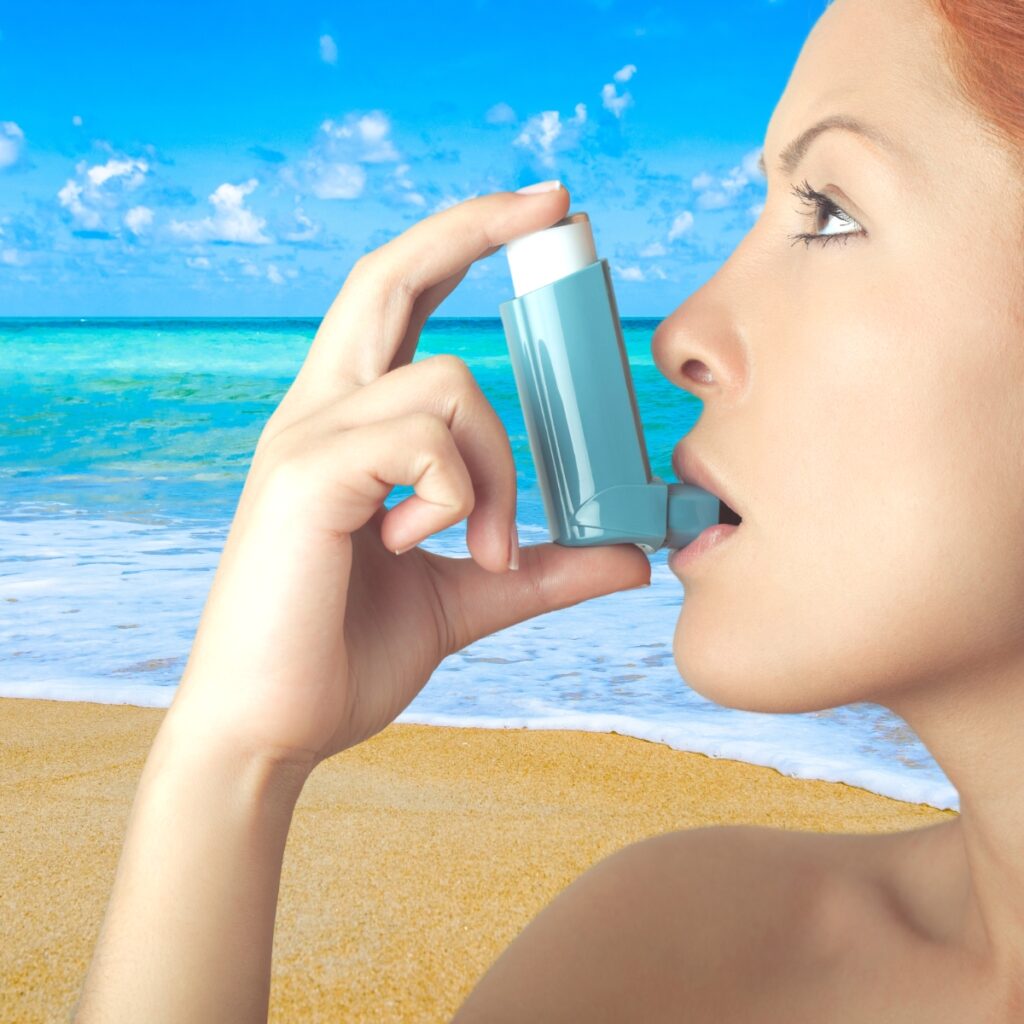Snuba is a great underwater adventure for people who want to try scuba diving but without the hassle of learning to breathe through a regulator.
But can you snuba with asthma? Let’s look at that question more closely.

In this post we'll cover:
Can You Go Snuba Diving with Asthma? What You Need to Know
What the Latest Research Says
- People with asthma have historically been told they can’t scuba dive, but the latest research suggests that those with mild or controlled asthma can do so safely. Snuba is relatively close to the surface (10 ft max)and is much safer than scuba.
- Studies have found that people with asthma are not more likely to have severe symptoms or complications during snuba diving than those without asthma.
- However, some experts believe that those with severe or uncontrolled asthma may be at a higher risk of drowning or severe health complications.
Risks of Diving with Asthma
- Diving with asthma can expose you to several possible triggers that can increase the chances of an asthma attack, such as breathing in cold and dry air, excessive physical exertion, and exposure to salty seawater.
- There’s also a risk of developing bronchospasms, which is a tightening of the muscles that line the large airways in your lungs.
- If you have an asthma attack underwater, you may not have enough energy to come back to the surface and could drown.
- People with allergic asthma caused by pollen allergies could also experience asthma symptoms if their breathing tank is contaminated with pollen.
Because Snuba isn’t that deep and you usually snuba with a larger group of people. The dangers are relatively low.
Clearance Guidelines
- If you have asthma, you must get medical clearance from your doctor before diving.
- Your doctor will assess how well your asthma is controlled and what your triggers are.
- They’ll also consider factors such as your swimming ability and level of strength and cardiovascular fitness.
Safety Tips
- Make sure to take your asthma medication before diving.
- Bring your inhaler with you in case of an emergency.
- Wear a full-face mask or hood to keep your airways warm and moist.
- Take regular breaks to rest and avoid overexerting yourself.
- Make sure to stay within your limits and never dive alone.
Takeaway
- People with mild or controlled asthma can scuba dive safely if they have normal lung function.
- Those with severe or uncontrolled asthma may be at a higher risk of drowning or severe health complications.
- Before diving, make sure to get medical clearance from your doctor and take all necessary safety precautions.
Risks of snuba Diving for Asthma Sufferers
Potential Dangers
- Drowning or getting the bends? No thanks!
- Bronchospasms can lead to airway blockage and air trapping.
- When you ascend, air in your lungs can expand and cause a rupture if you have inflammation or airway blockage.
- An asthma attack underwater can lead to drowning.
- Other respiratory conditions can cause air trapping too.
Pollen: The Silent Killer
- Allergic asthma caused by pollen can cause asthma symptoms if your breathing tank is contaminated.
- It’s rare, but it happened to at least one diver in 1998.
- So watch out for that pollen!
Prepping for a Snuba Dive with Asthma
Before You Dive
- Before you take the plunge, it’s important to make sure you’re in peak condition. Measure your peak flow with a spirometry test twice a day for at least 3 days before you dive. If your score drops 15 percent below normal, it’s best to stay out of the water.
- If you use a rescue inhaler, make sure your peak flow is normal for at least 48 hours before you dive.
- If you’re feeling wheezy or short of breath, it’s best to take a rain check on the dive.
- Take a rescue inhaler 30 minutes before diving to reduce the risk of bronchospasm.
- If there are any changes in your asthma control, it’s best to get medical advice before diving.
Staying Safe While Diving
- If your asthma is aggravated by cold, exercise, or emotion, it’s best to stay out of the water.
- Before you dive, make sure to discuss your asthma with your doctor.
- If you’re having breathing problems or a flare-up of symptoms, it’s best to stay out of the water.
- Never dive alone! Make sure you have a buddy with you.
- If you have congestion in your nose or ears, it’s best to stay out of the water.
- Follow all your diving instructor’s directions. They know what’s best.
Etiology of Asthma
What is Asthma?
Asthma is a chronic lung condition that causes difficulty breathing. It’s caused by inflammation in the airways, which can be triggered by allergens, irritants, or exercise.
What Causes Asthma?
Asthma is caused by a variety of factors, including:
- Allergens: Pollen, dust mites, pet dander, and mold can all trigger asthma symptoms.
- Irritants: Cigarette smoke, air pollution, strong odors, and chemical fumes can all cause asthma symptoms.
- Exercise: Exercise-induced asthma can be triggered by strenuous physical activity.
- Metabolism: Certain metabolic conditions can increase the risk of developing asthma.
- Physiopathology: Abnormalities in the structure of the airways can lead to asthma.
- Physical Fitness: Poor physical fitness can increase the risk of developing asthma.
Conclusion
If you have asthma and are considering snuba diving, it’s important to get medical clearance from your doctor first. With the right precautions and guidance, you can enjoy this unique experience safely. Remember to take it slow and steady – don’t dive too deep too quickly! And don’t forget to bring your sense of humor – after all, snuba diving is no laughing matter, unless you make it one!
Also read: Can you fly right after snuba? Find out!
